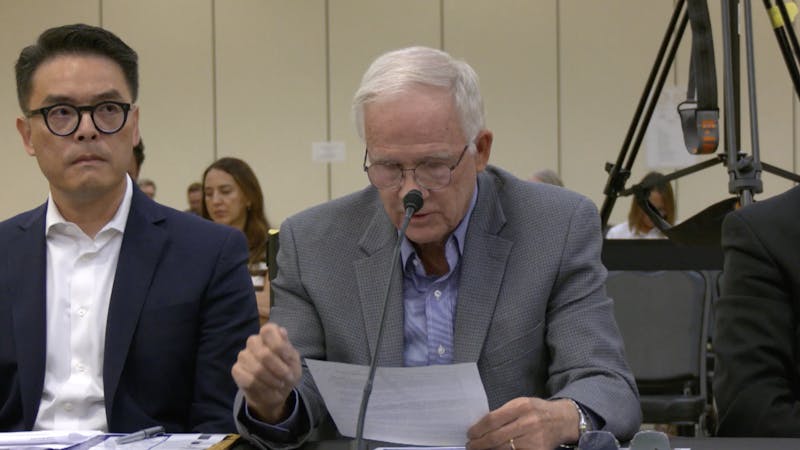Q&A with Ravi Prakash and Bobak Ferdowsi
The Rice Thresher: What was the most challenging part about the long process of building and developing the rover to put it on Mars?
Ravi Prakash: It seems like millions of things have to go right for us to land on Mars. And we can't overlook any one part, thinking that that will go fine, because that'll be the thing that kills us. For us, we developed a new radar for this mission ... [It] gave us a lot of problems.
Bobak Ferdowsi: For me, it was the whole testing program ... trying to understand what we can, within time and resources, actually test, and what doesn't merit testing. We had a large team, [but] we left some stones unturned in the testing program. We put the letters JPL on the wheels in Morse code, as a way of just checking each time you've turned the wheel, how far it's actually traveled. That might have been the most fun.
RT: Was the JPL code the easiest part for you as well?
RP: Everything we had to pay attention to - there was no part that we could just say, "Oh, that'll work." So I don't think there was an easiest part.
BF: You didn't think voting on my hair was the easiest part maybe?
RP: We sent out this poll prior to landing that said, "Should we wear team shirts? What color should [they] be?" and someone added, "What color should Bobak's hair be?" And the choices, I think, were red for Mars, gold because the mission control was labeled the "gold mission control," or red, white and blue. We voted red, white and blue, and no one knew what Bobak was going to do until landing day.
RT: At lunch earlier today, the role of politics in space exploration came up. Some people in politics argue that problems here on Earth need to be focused on first. What is your response to these arguments?
BF: That's certainly not the question for us to answer. I will say that I think there are a lot of positive aspects to what we do at NASA.
RP: I would say that NASA does help ... everyone across the world. We have now more satellites orbiting earth than [if you] add up everything else in the solar system. So we know our Earth much better than we would have without NASA. To put it in perspective, a week [of war] in Iraq is about the cost of the Curiosity mission. So if you're pushing on NASA, I think you're pushing on the wrong place.
BF: Sometimes, it's the challenges that we aren't aware of that result in some of our greatest accomplishments. I think it's really important to put in perspective how many of the things that were, at one point, a NASA challenge, but ended up microcomputing fuel cells. All these different things ... will potentially ultimately result in technologies that we just use in our everyday lives.
RT: Were you as nervous about the launch in general as you were about the landing?
RP: Definitely the most nervous I've been on this mission is landing. That's where we know Mars has killed us before. The launch vehicle, it's ... in someone else's hand. But [with] landing Bobak and I understood the things that could go wrong. There's so many things that have to go right. Our parachute has to deploy faster than the speed of sound. Our radar, which gave us a lot of problems on Earth, had to work on Mars, and this is an atmosphere ... this spacecraft had never been in before.
RT: I understand that today, you all sat in on some Rice design and engineering classes. How well do you feel that Rice is preparing students who want to go into space exploration?
BF: I'm a little jealous. I would say that their experience in some ways is vastly superior to what I think I had in undergrad, [which was a] more traditional, textbook approach to engineering. The design facility, [the Oshman Engineering Design Kitchen] that we saw, was totally incredible. I mean, I worked in a machine shop for a little bit when I was an undergrad, and that was, ... for me, one of the more tangibly exciting experiences. But seeing these guys ... program little things and having tasks they could actually accomplish by doing it hands-on, I think that's ... hugely valuable. They're working in teams, just like [the way] no engineer is in isolation, especially when you talk about the [kinds] of missions that NASA does - they're so complex that you're always working in teams. I think they may be better prepared when they get out of college than I was.
RP: Absolutely. I'm glad I don't have to compete for a job with them. I've been to many universities, and I haven't seen a hands-on approach like Rice University's [OEDK].
RT: Why did you decide to pursue a career in space exploration?
RP: Even though I grew up in NASA's backyard right here, it wasn't until after my freshman year of college that I knew I wanted to do something in space. My family took a trip to NASA, and I realized that every time I came ... I was inspired.
BF: I always liked science fiction and space exploration as a kid. It was not a foreign thought to me. I think the decisive moment for me was Pathfinder in 1997, which was right as I was graduating high school. It was that first moment in my history where I saw images come back from another planet. How crazy is this that we are able to do this on another planet? And that was, I think, the moment where I really kind of said, "This is what I want to be a part of - this NASA family and doing these seemingly crazy ideas, but [which are] so engaging and so cool."
More from The Rice Thresher

Rice announces Chao College as 12th residential college
Rice announced that the 12th residential college will be named Ting Tsung and Wei Fong Chao College Aug. 19. The college, set to open in fall 2026, will contain nearly 300 on-campus beds.
Dining access fund announced following on-campus unlimited meal swipes
Rice announced new food assistance programs on Tuesday to account for the controversial change in the on-campus meal swipe plan.

Rice disaster prediction model discussed at hearing on deadly Central Texas floods
The House and Senate Select Committees on Disaster Preparedness and Flooding held a hearing on July 31 in Kerrville to address the deadly July 4 flooding in Central Texas. The flooding along the banks of the Guadalupe River killed 108 people, including 37 children. In the charged hearing, Texas lawmakers and flood survivors criticized the local response to the disaster.


Please note All comments are eligible for publication by The Rice Thresher.